
9 Days Nujiang Grand Canyon Tour with Dulongjiang River Valley Hiking Adventure
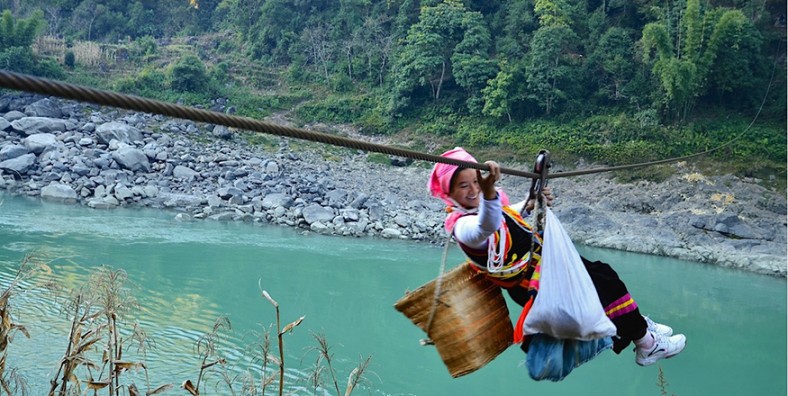
Tour Overview
Dulong River is the first order affluent of Irrawaddy River, stretching across China and Myanmar. It originates from the southeast of Tibet, flows through Yunnan Province and runs into...
Length of Travel: 9 Day
Destinations of Tour: Liuku-Gongshan-Kongdang-Bingzhongluo-Liuku
Departure City: Kunming
Price of Tour: Request
Type of Tour:
Features of Tour:
Dulong River is the first order affluent of Irrawaddy River, stretching across China and Myanmar. It originates from the southeast of Tibet, flows through Yunnan Province and runs into Myanmar in Gongshan County. Dulong River Canyon is a mysterious and remote canyon with an altitude from 1000 to 4936 meters. The canyon preserves intact sustainable landscape and contains rich natural resources. This tour is designed for those who like exploring new thing.
Highlights:
- Sightsee the Nujiang Grand Canyon and feel the true charm of nature.
- Hike in Dulongjiang river valley and Bingzhongluo, explore ethnic villages there.
- Experience the ethnic culture of Lisu, Nu and Dulong minorities.
Brief Itinerary
- Day 1: Liuku Arrival
- Day 2: Liuku-Gongshan
- Day 3: Gongshan-Kongdang
- Day 4: Kongdang
- Day 5: Kongdang
- Day 6: Kongdang-Bingzhongluo
- Day 7: Bingzhongluo
- Day 8: Bingzhongluo-Liuku
- Day 9: Liuku Departure
Google Map
Detailed Itinerary
Day 1 Arrival in Liuku
Sightseeing and Activities: Nujiang River, Nujiang River Bridge
Accommodation: Liuku
Meals: Lunch
Arrive at Liuku Town, visit Nujiang River and Nujiang River Bridge.
The Nujiang River is China’s important river flowing from north to south. It has its source on the southern slope of the Tanggula Mountain Range in Tibet Autonomous Region, flowing across the Tibet Autonomous Region and Yunnan Province, with a total length of 2,816 kilometers and a drainage area of 324,000 square kilometers.
The name of the river is changed into the Salween River after flowing into Burma from China, and it finally empties into the Andaman Sea of Indian Ocean at the Moulmein. The upper reaches of the river are known as the Naqu River in Tibetan. The river is called Anurimei by the Nu ethic minority, Anu is the name of the Nu people called by themselves, the Rimei means the river, so Anurimei means the river dwelled by the Nu people.
Day 2 Liuku-Gongshan
Sightseeing and Activities: the Nujiang Grand Canyon, Laohutiao Gorge, the Flying Stones and the Stone Moon
Accommodation: Gongshan
Meals: Breakfast and Lunch
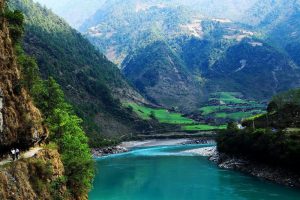
Drive from Liuku to Gongshan. On the way you can enjoy the beautiful landscapes of the Nujiang Grand Canyon with Laohutiao Gorge, the Flying Stones and the Stone Moon.
The 247-kilometer-long Nujiang River Gorge is flanked by two 4,000-meter-high mountains. The mountain peaks on the two sides have an average altitude of over 3,000 kilometers. The gorge is located in Yunnan Province in southwestern China, an area rich in ethnic minority culture. It is now a first choice for many domestic and foreign travelers.
The Dulong (also known as Drung) ethnic group is one of the smallest ethnic groups in China. With a total population of about 5,816 (data from the census in 2000), the Dulong people mainly live in the Dulong River Valley in the Gongshan Dulong and Nu Autonomous County in north-western Yunnan Province.
Day 3 Gongshan-Kongdang
Sightseeing and Activities: Dulongjiang River Valley, Bukawa Village, Dulongjiang Valley
Accommodation: Kongdang
Meals: Breakfast and Lunch
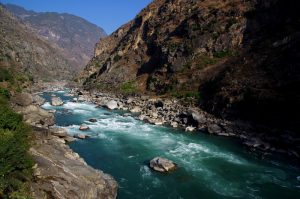
It is 3 hours driving today with the rough road in the virgin forest. Nu ethnic minority lives mainly in Yunnan Province’s Bijiang, Fugong, Gongshan and Lanping counties, which comprise the Nujiang Lisu Autonomous Prefecture. Others are found in Weixi County in the Diqing Tibetan Autonomous Prefecture. The Nu people are mainly engaged in agriculture, but also hunt and gather wild plants. Their main crops include corn, buckwheat, barley, potatoes and beans. Some Nu people support themselves through cottage industries such as weaving, wine brewing, iron forging, etc.
Visit Bukawa Village and enjoy the fantastic scenery of Dulongjiang Valley in the afternoon.
Day 4 Kongdang-Bapo-Maku-Qinlangdang-Kongdang
Sightseeing and Activities: Dulongjiang River Valley, Maku Village, Dulongjiang River Region, Qinlangdang Village, Trekking
Accommodation: Kongdang
Meals: Breakfast and Lunch
Drive about 30 kilometers southward to Maku Village. Get into Maku Village and start a fantastic trekking trip to Dulongjiang River Region. You will see the Haba Waterfall from Maku Pass and then trek along the virgin forest down to Qinlangdang Village. Arrive in Qinlangdang Village in the afternoon and trek about 1 kilometer to arrive at Haba Waterfall, here is the only way to Myanmar from Dulongjiang River.
Drive back to Kongdang.
Note: There are lots of leeches in the virgin forest in summer, so you should take some medicine to keep them away.
Day 5 Kongdang-Xianjiudang-Longyuan-Kongdang
Sightseeing and Activities: Dulongjiang River Valley, Longyuan Village
Accommodation: Kongdang
Meals: Breakfast and Lunch
Drive about 30 km to Longyuan Village, visit the original villages as well as the old tattoo women, if you want to take photos for them, you have to give the tips. Come back to Kongdang.
Day 6 Kongdang-Gongshan-Bingzhongluo
Sightseeing and Activities: Bingzhongluo, Nujiang River (Salween River), First Bend of Nujiang River, Stone House of the Nu Minority, Peach Island, the Tibetan Puhua Temple, Excursion
Accommodation: Bingzhongluo
Meals: Breakfast and Lunch
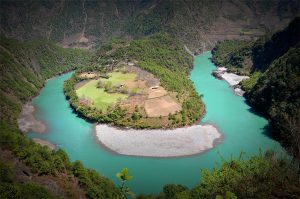
Drive 96 km back to Gongshan Derung and Nu Autonomous County. It is also 3 hours driving but with beautiful original forest.
A half day excursion to Bingzhongluo, sightseeing includes the First Bend of Nujiang River (Salween River), the stone house of the Nu minority, Peach Island, the Tibetan Puhua Temple. You will then have the chance to visit a minority household and experience the life of the local people. Overnight in Bingzhongluo.
Day 7 Bingzhongluo
Sightseeing and Activities: Bingzhongluo, Trekking
Accommodation: Bingzhongluo
Meals: Breakfast, Lunch and Dinner
In Bingzhongluo, we see groups of horses and mules milling at street corners and waiting to set off on the next journey north. The caravan drivers would spend a couple of days in Bingzhongluo to stock up on groceries and goods to be delivered and animal feed for the journey.
Walking with the horse caravan can be a tiring experience. Unlike human, the horses/mules only rest twice a day- at midday (lunch) and at night when they stop. Therefore unlike trekking where one would normally take a break after a couple of hours, there are no such opportunities with the caravan, it can be quite tiring.
Day 8 Bingzhongluo-Liuku
Sightseeing and Activities: Nujiang River (Salween River), Nujiang Grand canyon, Laomudeng Village
Accommodation: Liuku
Meals: Breakfast, Lunch and Dinner
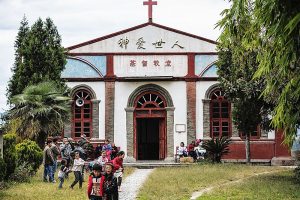
Leave Gongshan and drive 110 km through the fascinating mountain areas to Fugong. Sightseeing includes a visit to a suspension bridge and a glide cable. Special Lishu food will be served during dinner. In the evening you will take part in a party with the local people.
Return to Liuku. Enjoy your last day at Nujiang Grand Canyon and visit Laomudeng Village and the bathhouse of Lishu minority. It is a tradition to welcome new year that all people take a bath together in the open hot springs by the banks of the river.
Overnight in Liuku.
Day 9 Departure from Liuku
Sightseeing and Activities: Nujiang Grand Canyon
Accommodation: None
Meals: Breakfast
End the wonderful adventure tour of Nujiang Grand Canyon. Transfer back to Kunming. Service ends.
Recommended Hotels
| Destination | 5 Star | 4 Star | 3 Star | Hostel |
|---|---|---|---|---|
| Liuku | / | / | Shengshi Hongbang Hotel | / |
| Gongshan | / | / | Nu Xia Hotel | Fusheng Manor Inn |
| Kongdang | / | / | / | / |
| Bingzhongluo | / | / | Nu Xia Hotel | Fusheng Manor Inn |
Service Included:
- Admission fees for all of the sightseeing spots listed in the itinerary;
- Meals as listed in the itinerary;
- Hotels as listed in the itinerary;
- Private English-speaking tour guide;
- Private vehicle for transfers & sightseeing with skilled driver;
- Service charge & government taxes;
- Luggage transfers between airports and hotels.
Service Excluded:
- Any arrival and departure international airfares or train tickets;
- Chinese visa fees;
- Excess baggage charged by Airlines;
- Single room supplement;
- Tips to guides and drivers;
- Personal expenses and gratuities to service staff;
- Personal travel accident insurance;
- All optional programs.

 7 Days GolfingTour
7 Days GolfingTour
 8 Days Group Tour
8 Days Group Tour
 8 Days Yunnan Tour
8 Days Yunnan Tour
 7 Days Shangri La Hiking
7 Days Shangri La Hiking
 11 Days Yunnan Tour
11 Days Yunnan Tour
 6 Days Yuanyang Terraces
6 Days Yuanyang Terraces
 11 Days Yunnan Tour
11 Days Yunnan Tour
 8 Days South Yunnan
8 Days South Yunnan
 7 Days Tea Tour
7 Days Tea Tour
 8 Days Muslim Tour
8 Days Muslim Tour
 12 Days Self-Driving
12 Days Self-Driving
 4 Days Haba Climbing
4 Days Haba Climbing
 Tiger Leaping Gorge
Tiger Leaping Gorge
 Stone Forest
Stone Forest
 Yunnan-Tibet
Yunnan-Tibet
 Hani Rice Terraces
Hani Rice Terraces
 Kunming
Kunming
 Lijiang
Lijiang
 Shangri-la
Shangri-la
 Dali
Dali
 XishuangBanna
XishuangBanna
 Honghe
Honghe
 Kunming
Kunming
 Lijiang
Lijiang
 Shangri-la
Shangri-la
 Yuanyang Rice Terraces
Yuanyang Rice Terraces
 Nujiang
Nujiang
 XishuangBanna
XishuangBanna
 Spring City Golf
Spring City Golf
 Snow Mountain Golf
Snow Mountain Golf
 Stone Mountain Golf
Stone Mountain Golf














